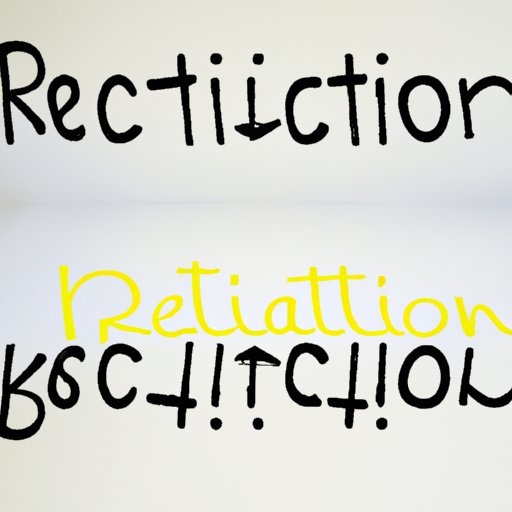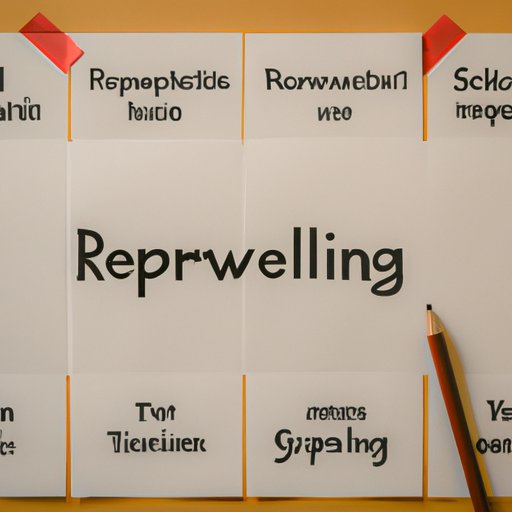Introduction
Reflection writing is an effective way to explore your thoughts and feelings about a particular experience or event. It can help you gain insight into yourself, and it can be used as a tool for personal growth and development. In this article, we’ll discuss what reflection writing is, the benefits of doing it, and how to get started.
A Beginner’s Guide to Reflection Writing
Reflection writing can be intimidating for those who are new to it. But with a little guidance and practice, it can become a helpful and rewarding activity. Here is a beginner’s guide to reflection writing.
What is Reflection Writing?
Reflection writing is the process of recording your thoughts and feelings about a particular event, experience, or situation. The purpose of reflection writing is to explore your own ideas and opinions about something, and to gain insight into yourself. It can also be used to reflect on past experiences and how they may have impacted your current situation.
How to Get Started with Reflection Writing
The best way to get started with reflection writing is to set aside some time each day to write. You don’t need to write long essays or lengthy paragraphs—just jot down your thoughts and feelings in whatever form feels most natural to you. You can also use prompts or topics to help focus your writing. Once you’ve written your reflections, take a few moments to read them over and consider any insights or revelations that may come up.

How Reflection Writing Can Help You Reflect and Grow
Reflection writing can be a powerful tool for self-reflection and personal growth. Through reflection writing, you can identify your strengths and weaknesses, and use this knowledge to develop yourself further. Here are some ways that reflection writing can help you reflect and grow.
Identifying Your Strengths and Weaknesses
By taking the time to reflect on your thoughts and feelings, you can gain a better understanding of yourself and your strengths and weaknesses. This can be an invaluable tool for personal growth and development. By identifying your strengths and weaknesses, you can work on improving areas where you feel you need more work and build on the areas where you excel.
Using Reflection Writing as a Tool for Self-improvement
Once you’ve identified your strengths and weaknesses, you can use reflection writing as a tool for self-improvement. By reflecting on your thoughts and feelings, you can learn from past experiences and make adjustments to your behavior or approach. This can help you become a better version of yourself and achieve your goals.
Tips for Writing a Successful Reflection Paper
Writing a successful reflection paper takes practice and dedication. Here are some tips to help you write an effective reflection paper:
Choose a Topic or Prompt
Before you start writing, choose a topic or prompt that will be the focus of your reflection paper. This could be anything from a life experience to an event or situation. Make sure the topic is something that interests you and will keep you engaged while you’re writing.
Brainstorm Ideas
Once you’ve chosen a topic, take some time to brainstorm ideas and jot down any thoughts you have about the topic. This can help you organize your thoughts and narrow down the focus of your reflection paper.
Organize Your Thoughts
Organizing your thoughts can help you create a clear and concise reflection paper. Take some time to create an outline of your thoughts and ideas, and then use this as a guide when writing your paper.
Write the Reflection Paper
Once you have an idea of what you want to write about, it’s time to start writing. Follow your outline and make sure to include enough detail to make your points clear and engaging. Don’t forget to include your thoughts and feelings, as this is the most important part of the reflection paper.
Proofread and Edit
Once you’ve finished writing your reflection paper, take some time to proofread and edit it. This will help you ensure that your paper is free of errors and that it effectively conveys your thoughts and feelings. Consider asking someone else to read your paper and provide feedback.

Using Reflection Writing to Enhance Your Creative Thinking
Reflection writing can also be used to enhance your creative thinking. By reflecting on your thoughts and feelings, you can identify new perspectives and explore your imagination. Here are some ways to use reflection writing to enhance your creative thinking.
Identifying New Perspectives
Reflection writing can help you gain insight into yourself and identify new perspectives. By reflecting on your thoughts and feelings, you can gain a deeper understanding of yourself and the world around you. This can help you think outside the box and generate new ideas.
Exploring Your Imagination
Reflection writing can also help you explore your imagination. As you reflect on your thoughts and feelings, you can allow your mind to wander and come up with creative solutions to problems or challenges. This can help you expand your creative thinking and come up with innovative ideas.
Generating New Ideas
Reflection writing can also help you generate new ideas and find creative solutions to problems. By reflecting on your thoughts and feelings, you can tap into your inner creativity and come up with fresh ideas that can be applied to real-world problems.
Conclusion
Reflection writing can be a powerful tool for self-reflection and personal growth. It can help you identify your strengths and weaknesses and use this knowledge to develop yourself further. It can also be used to enhance your creative thinking and generate new ideas. With a little guidance and practice, reflection writing can be an incredibly rewarding activity.
In summary, reflection writing can be a great way to explore your thoughts and feelings, gain insight into yourself, and use this knowledge to reflect and grow. With the right tools and techniques, you can use reflection writing to become a better version of yourself and achieve your goals.
(Note: Is this article not meeting your expectations? Do you have knowledge or insights to share? Unlock new opportunities and expand your reach by joining our authors team. Click Registration to join us and share your expertise with our readers.)
